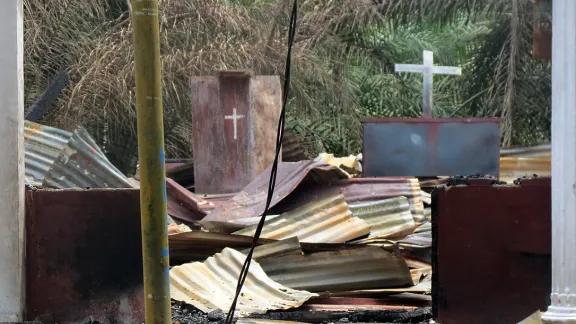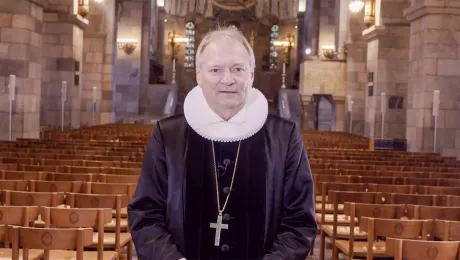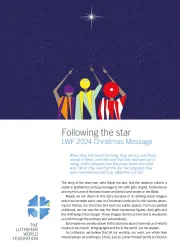
Two crucifixes remain upright in the remnants of an Indonesian church burned in October 2015. Photo: LWF Indonesia
Indonesian Lutheran congregations seek support to end religious marginalization
(LWI) - A mother’s lament echoes the pain of religious intolerance in multi-faith Indonesia.
“We have been living peacefully already for many years, but why are we forced to witness our churches burned and destroyed?” cries the woman during an interview with a visiting team of The Lutheran World Federation (LWF) Indonesia National Committee to Aceh Singkil in North Sumatra.
Aceh Singkil’s 20,000 Christians are afraid to express their faith even though religious freedom is constitutionally guaranteed and the country’s diversity is held up as an example for the world.
On 13 October, 1,000 extremists calling themselves the Islamic Defender Youth, or Pemuda Peduli Islam (PPI), torched a church belonging to the Indonesian Christian Church (HKI) and attacked members of the nearby Pakpak Dairi Christian Protestant Church (GKPPD).
A Muslim man was killed during the attack and the incident heightened tension as a member of the GKPPD was charged with the murder. In the aftermath, 7,000 Christians fled their homes seeking safety in the neighboring areas. The government convinced them to return four days later.
A week before the incident, the extremist group had urged the government to uphold laws on worship houses that limited their number to just one church and four chapels in the community, though these laws breach agreements reached in 1979 and 2001.
Century-old family lineage
Churches and civil society organizations lament the government’s lack of foresight. The government failed to anticipate the effect of limiting Christians’ rights to religious liberty in the country, they say.
“The government must have known this type of incident would take place, so why did they not prevent it?” asks Rev. Tulus Hutagalung of the HKI.
Churches have been part of the community in Aceh Singkil long before Indonesia’s independence in 1945, and remain vital in areas that are predominantly Christian.
During the visit after the church was burned down, GKPPD members narrated how their ancestors came from Singkil 100 years ago. “I am the third generation of Christians in my family,” said 59-year old Tumanggor, showing visitors his family’s century-old tomb.
Stringent legal restrictions
Singkil is part of Aceh province, which is autonomous and governed by Sharia law after the 2005 Helsinki Peace Accord was struck between the government and the Free Aceh Movement (GAM). However, there is no license under the agreement or Sharia law to discriminate against other religions.
Christians in Singkil find it difficult to worship after the 13 October incidents and the government’s demolition of nine churches days later. The latter action took place at the request of Islamic groups insisting that churches in Aceh Singkil are illegal because they do not hold government permits.
According to the human rights office of the LWF Indonesia National Committee, it is difficult for churches to apply to the state authorities for building permits. A 2006 decree requires 90 signatures from church members and 60 signatures from different faith or church groups.
Churches exist in areas where Christians are the majority. “How will we satisfy the signature requirement if they cannot reach the required 60 signatures? This law does not make any sense in terms of freedom of religion or belief as it is stated in the national constitution,” says GKPPD Bishop Elson Lingga.
In the meantime, Christians from the nine churches that were demolished in Aceh Singkil have no place to worship. Moreover, they are not allowed to put up tents beside the church ruins or move their worship to their homes. Police and military are keeping them from the church sites.
The LWF National Committee in Indonesia, which is made up of the 13 LWF member churches in the country has mobilized trauma counseling teams that continue to accompany the affected congregation members. It is also urging other church bodies and civil society organizations to support the churches in their advocacy for freedom to worship and in dealing with the related legal implications.
A contribution by Fernando Sihotang, LWF National Committee in Indonesia.


